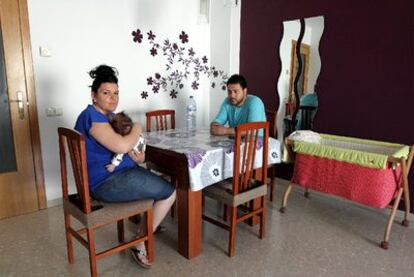Jobless household: "We get 426 euros a month and that runs out in May"
In the first quarter of the year, 1.38 million households had no breadwinner. One in five unemployed people is not entitled to unemployment or jobseekers' benefit, and have no income at all.
José Antonio Rodríguez and his wife Raquel Lara, a Barcelona couple in their thirties with a small child, are finding it hard to sleep at nights. Little wonder. "Our outgoings are 1,200 euros a month, but our only income is the 426 euros that my wife is paid by the state since her unemployment benefit ran out. [This] month's payment will be the last. At least the apartment we live in is rented," he says, adding that friends of theirs have lost their home after failing to meet mortgage payments. "We spend700 euros on the rent, water, light, and gas, nappies, and other stuff for the baby. At least she is still breast-feeding." So far, he says that they have survived by using the small amount of money they were able to save from the 1,200 euroshe earned when working, and the 800eurosunemployment benefit his wife was paid.
The couple know that within weeks, they will be heavily dependent on their parents. "One day we'll eat in my parent's place, and the next in hers," says Rodríguez. Not that things are much better back home. In José Antonio's family household, the only income comes from his mother. His father and brother are unemployed, and receive just 426 euros a month from the state in lieu of unemployment benefit. At Raquel's place, only her father works: her mother is unable to work due to illness, but receives no pension.
The couple say that they are not receiving any help from the regional government of Catalonia. Neither are they entitled to food stamps, and much less the 100 euros a month to which working mothers are supposedly allowed to claim for each child until it is three. "The whole situation is upside down," he says: "Women with work get the money, but those who have lost their jobs get nothing." With a child to bring up, the couple say that they are not ruling anything out, even working in the shadow economy. "There just isn't any work to be found," says José Antonio.
Raquel says that she is prepared to work as a cleaner, but that at the local job center the only cleaning jobs are for people with minor physical disabilities. "It is so frustrating. And we have friends who are in an even worse situation: people who have lost their homes, who are living with their parents. We are prepared to do any kind of work," she says.

Tu suscripción se está usando en otro dispositivo
¿Quieres añadir otro usuario a tu suscripción?
Si continúas leyendo en este dispositivo, no se podrá leer en el otro.
FlechaTu suscripción se está usando en otro dispositivo y solo puedes acceder a EL PAÍS desde un dispositivo a la vez.
Si quieres compartir tu cuenta, cambia tu suscripción a la modalidad Premium, así podrás añadir otro usuario. Cada uno accederá con su propia cuenta de email, lo que os permitirá personalizar vuestra experiencia en EL PAÍS.
¿Tienes una suscripción de empresa? Accede aquí para contratar más cuentas.
En el caso de no saber quién está usando tu cuenta, te recomendamos cambiar tu contraseña aquí.
Si decides continuar compartiendo tu cuenta, este mensaje se mostrará en tu dispositivo y en el de la otra persona que está usando tu cuenta de forma indefinida, afectando a tu experiencia de lectura. Puedes consultar aquí los términos y condiciones de la suscripción digital.








































